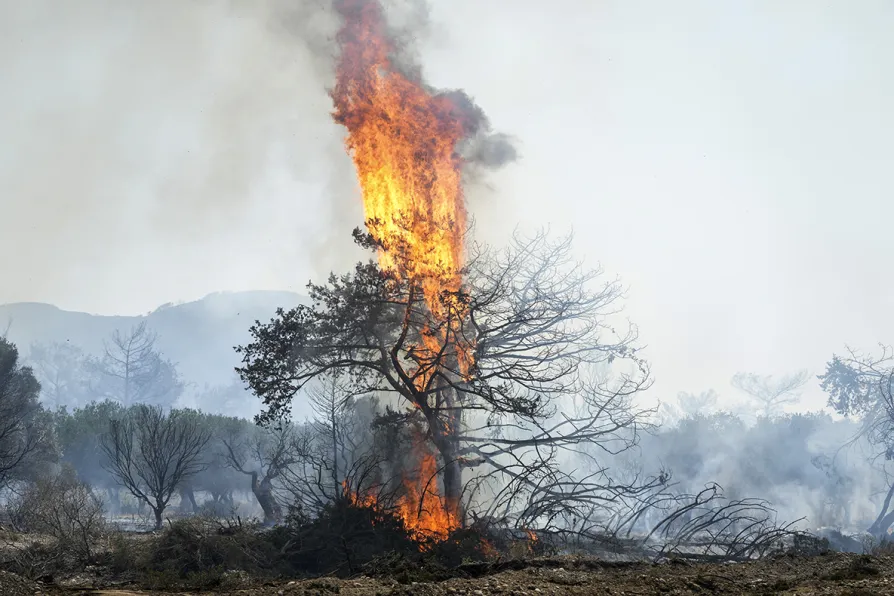
 Flames burn a tree in Vati village, on the Aegean Sea island of Rhodes, southeastern Greece, July 25, 2023
Flames burn a tree in Vati village, on the Aegean Sea island of Rhodes, southeastern Greece, July 25, 2023
AS heatwaves and wildfires sweep across swathes of southern Europe, north Africa and North America, today’s report from the World Weather Attribution (WWA) rang timely alarm bells.
WWA scientists predict that highly inflammatory temperatures of up to 45°C (Palermo has just reached 47°C) should no longer be regarded as unusual.
They estimate that heatwaves of the kind we have seen this July can be expected to recur around once every 15 years in North America, every 10 years in Europe and every five years in China.
Moreover, they warn that if the planet’s temperatures rise by another 1°C, on top of the 1°C increase since the late 19th century, heatwaves and wildfires will strike even more frequently.
Underlying these projections is the certainty — supported by an Everest-sized pile of scientific evidence and shared by almost all climate scientists and their professional organisations — that human activity is by far the biggest cause of global warming.
Industrialisation and deforestation have long since passed the point at which the global output of greenhouse gases, notably carbon dioxide (CO2), can be absorbed by the world’s oceans and forests or destroyed in the stratosphere. Instead, surplus gases trap the escalating levels of heat in the atmosphere.
This global warming intensifies the conditions in which wildfires can ignite and spread while also disrupting and exacerbating weather systems.
It is also the context in which we should consider Britain’s contribution to global warming and the life-and-death struggle to contain, reduce and stop it.
Of course, vested interests and their dupes argue that our own carbon emissions today account for no more than 1 per cent or so of the global total. However, as one of the world’s biggest and most advanced economies, we are in the top 20 of greenhouse gas generators, behind only the likes of China and India (which have a relatively low per capita output), the US, Russia, Japan, Germany, South Korea and Iran.
Nonetheless, by any measure, British capitalism has made a disproportionately large contribution to global warming over the past 200 years. We have a responsibility to cut our emissions more deeply and rapidly than economies desperately in need of development.
Yet the Westminster government and the Labour opposition have spent the past week — of all weeks — diluting the case and the policies for meeting Britain’s net-zero emissions target by 2050.
The Conservatives favour the exploitation of new oil, gas and coal sources while blocking onshore wind developments. With Labour’s support, they are pushing ahead with a major rearmament programme. As the Scientists for Global Responsibility point out in their invaluable report, The Environmental Impacts of the UK Military Sector (2020), the production, testing and use of armaments contribute hugely to greenhouse gas emissions — yet the figures are concealed from the public and excluded from official statistics by Britain and many other states.
The Labour leadership has announced the postponement of its Green Investment Plan even before winning a general election and taking office.
Instead of explaining the need for ultra-low emission zones (Ulez) based on genuine local consultation and support for people’s jobs and living standards, Keir Starmer blames London’s Labour mayor and Ulez for the party’s defeat in a parliamentary by-election.
Why the backsliding?
Both parties must know the scale of programmes necessary to reach net zero. We need massive job-creating investment not only in renewable energy (not least in wind, solar and tidal power), but also in the decarbonisation of key industries, cleaner public transport, land and livestock management, home heating and insulation, and much else besides.
Such an enormous endeavour will require planning, public finance and public ownership on an unprecedented scale. It cannot be left to the banking, energy, agribusiness and transport monopolies and their profit-driven “market forces.” Which brings forward the dreaded “S-word” — socialism.














